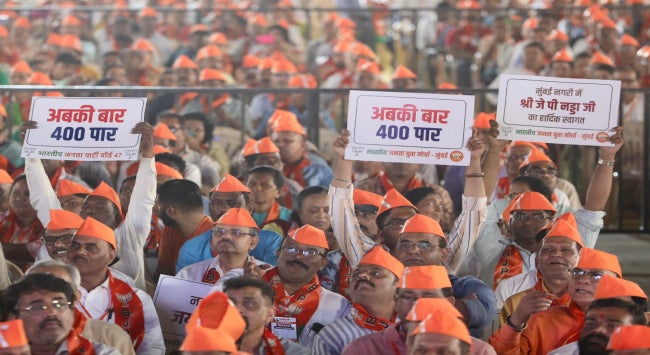Summary
With the general elections in India expected to be announced soon, the opposition faces an uphill task in preventing Prime Minister Narendra Modi’s recent prediction of an overwhelming majority for the Bharatiya Janata Party from coming true.
In the final session, before the general elections are announced, of both houses of the Indian parliament on 6 February 2024, Prime Minister Narendra Modi unusually made a prediction about the poll results. He announced that the Bharatiya Janata Party (BJP) will win at least 370 of the 543 Lok Sabha (Lower House) seats on offer, if not cross 400, which is the stated target of his party. The BJP on its own has 303 seats in the outgoing Lok Sabha. While poll predictions, often inflated by political leaders, are not uncommon to boost the morale of party workers and send a signal to voters, this was a rare instance of the parliament being used for such forecasting.
Modi’s confidence was partly based on his own assessment of the BJP’s election prospects. It was also an indication of the state of the opposition in the run-up to the general elections. Several events over the past few weeks have contributed to significantly weakening the opposition.
First, the decision of Bihar’s chief minister and a member of the opposition Indian National Developmental Inclusive Alliance (INDIA), Nitish Kumar, to jump ship and join hands with the BJP was a significant setback for the opposition. Kumar, who was part of an alliance with the Rashtriya Janata Dal in Bihar, not only switched sides but also brought down the state government. After doing so, he was sworn in as Bihar’s chief minister for a record ninth time with the BJP as an alliance partner. Though Kumar has been switching parties regularly from 2013 onwards to keep himself politically relevant, the timing dealt a huge blow to opposition unity and INDIA’s prospects in Bihar. Many felt that Bihar, with 40 Lok Sabha seats, might have been one the biggest challenges for the BJP in the Hindi belt but it now no longer seems so.
Second, seat-sharing arrangements within INDIA, particularly between regional parties and the Congress, have hit roadblocks. Both the Trinamool Congress in West Bengal and the Aam Aadmi Party (AAP) in Delhi are not keen on sharing seats with the Congress in their respective states. There was some good news though for the opposition from the key state of Uttar Pradesh, which sends 80 members to parliament. The Samajwadi Party (SP) has sealed a seat-sharing deal with the Congress where the SP will contest 63 seats and the Congress 17. However, the weak bargaining power of the Congress, especially after its defeats in the state elections in Chhattisgarh, Madhya Pradesh and Rajasthan in end-2023, could prove to be a deal breaker in other states.
Third, the Enforcement Directorate (ED), which reports to the central government, has gone after several opposition leaders, including Jharkhand Mukti Morcha leader and former Jharkhand chief minister, Hemant Soren. He was arrested on 31 January 2024 and remanded to ED custody on 2 February 2024 by a special court. He has since resigned as chief minister and, in a fiery speech in the Jharkhand Assembly, during the confidence motion moved by his party, alleged that the central government had hatched a conspiracy against him. At the time of writing, Soren remains in custody with his petition against the ED yet to be taken up by the Jharkhand High Court. The ED is also after Delhi Chief Minister Arvind Kejriwal who has ignored several summons from the ED in an excise policy case, which has already seen senior AAP leaders, including Delhi’s Deputy Chief Minister Manish Sisodia, taken into custody.
Fourth, on 6 February 2024, an important member of INDIA, Sharad Pawar, suffered a setback when the Election Commission (EC) recognised the breakaway faction of the Nationalist Congress Party (NCP), led by Pawar’s nephew and Maharashtra Deputy Chief Minister Ajit Pawar as the real NCP. The EC also awarded the party’s poll symbol – the clock – to Ajit’s faction. While Sharad has challenged the EC’s decision in the Supreme Court, he might, as of now, have to contest any coming elections on a general or free symbol offered by the EC.
Finally, as has often been the case before major elections in the past few years, opposition leaders have made a beeline for the BJP. One of the more prominent such instances is former Congress leader and Maharashtra chief minister, Ashok Chavan, who joined the BJP on 13 February 2024. Chavan, who served as chief minister between 2008 and 2010, and was the Maharashtra party president from 2015 to 2019, was one among several former Congress chief ministers who have joined the BJP in recent times. These include former Andhra Pradesh chief minister Kiran Reddy in 2023 and former Punjab chief minister Amarinder Singh in 2022.
As things stand, the BJP will contest the general elections from a position of strength. With no common narrative or ideology binding the opposition alliance, it has its task cut out in preventing the BJP from winning a handy majority.
. . . . .
Dr Ronojoy Sen is Senior Research Fellow and Research Lead (Politics, Society and Governance) at the Institute of South Asian Studies (ISAS), an autonomous research institute at the National University of Singapore (NUS). He can be contacted at isasrs@nus.edu.sg. The author bears full responsibility for the facts cited and opinions expressed in this paper.
Pic Credit: BJP Twitter Account
-
 More From :
More From :
-
 Tags :
Tags :
-
 Download PDF
Download PDF



